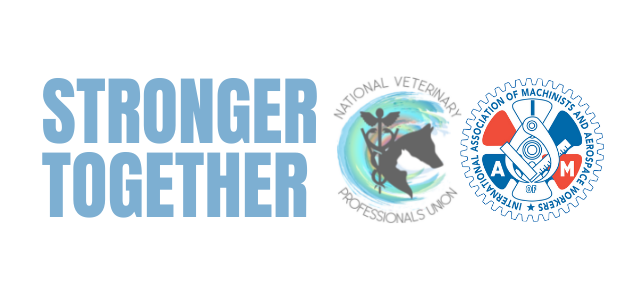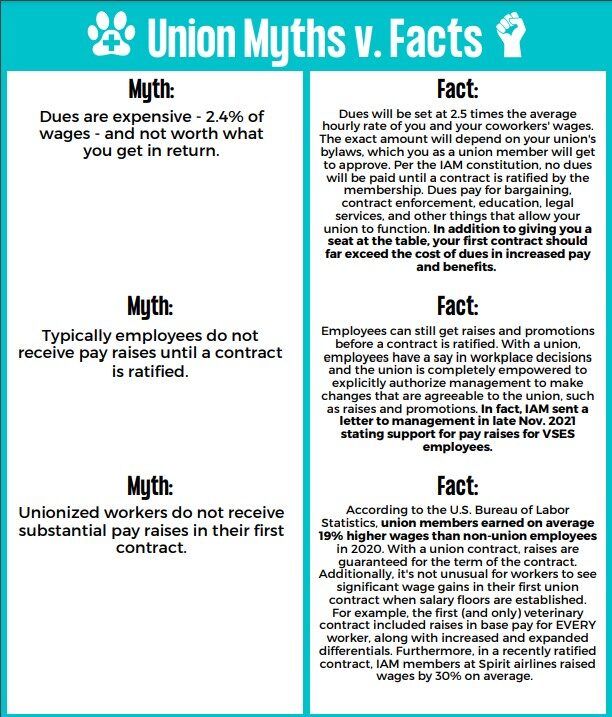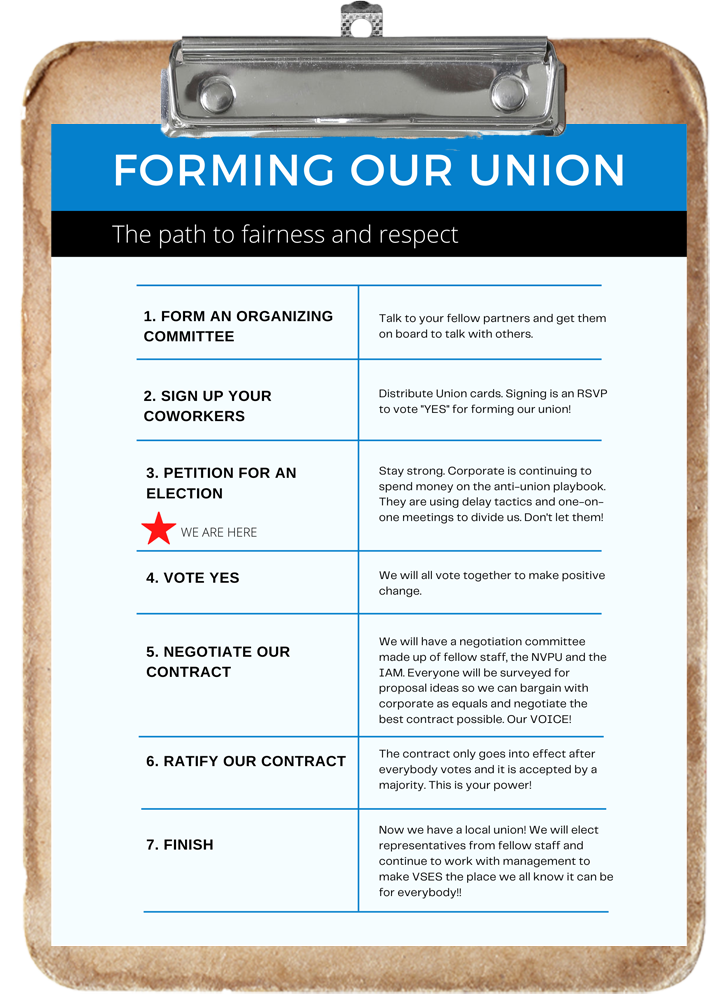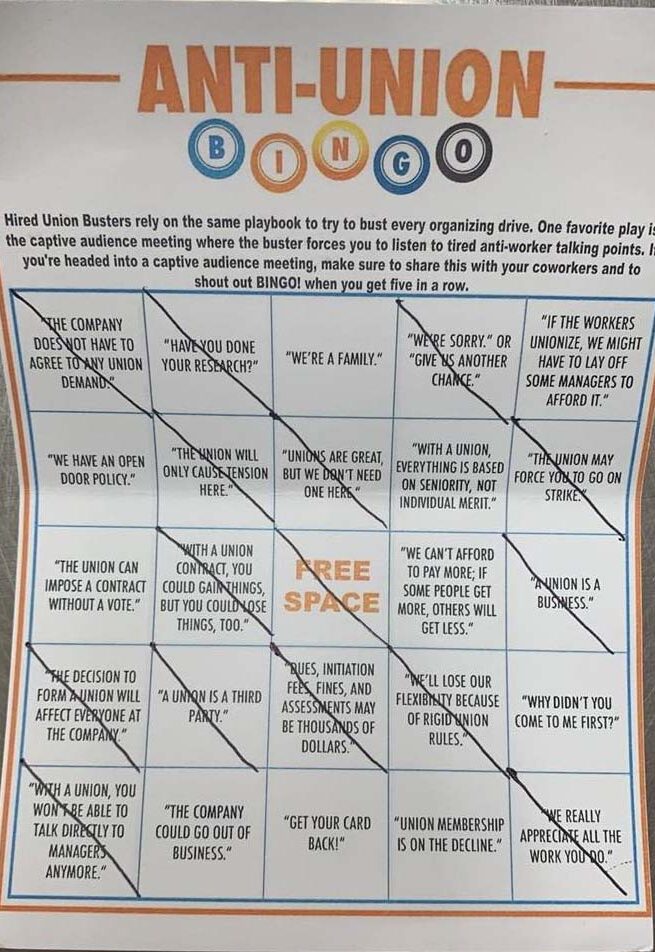Better Pay & Benefits
Even though veterinary services are in higher demand than ever, vets and vet techs are not being fairly compensated for their work. With a union, you and your coworkers can negotiate for the pay and benefits you deserve.
Work-life Balance
Vet professionals are often at the mercy of their manager when it comes to scheduling, which generally means long and inconsistent hours. As union members, you will have a say in notice and scheduling to adequately plan for your work and family responsibilities.
Improved Workplace Standards
During the pandemic, workplace safety standards and protocols are more important than ever. In addition to not receiving hazard pay, many vet clinics do not have adequate PPE and sufficient safety practices. By uniting, you can raise workplace standards.
Union Myths vs. Facts
There have been numerous union myths circulating regarding issues such as dues, pay raises, collective bargaining and more. Take a moment and click the learn more button to see all the myths and facts regarding the VSES Union.
LEARN MOREDespite filing for a union election nearly 2 months ago, we are currently in a waiting period. That’s because Pathway’s attorneys forced a National Labor Relations Board (NLRB) hearing by arguing the proper bargaining unit in the election should be all Monroe General practices and VSES (as opposed to just VSES). It’s a weak argument from Pathway and they know it. Their real goal was to delay the election so the union busters could have more time to intimidate you. Unfortunately, we have no choice but to wait for the NLRB Regional Director’s decision. Currently, there is no set timeline to when a decision will be provided. You can read the full Union Briefs & Pathway Attorneys Briefs. Transcripts from the hearing are also available here:
Day 1;Day 2;Day 3;Day 4OUR CURRENT FOCUS
Once the delay tactics are exhausted, you will then vote and win your election. After the vote, you can collectively address the most prominent issues that you face and begin making meaningful change. You will elect your negotiations committee, who will then survey the staff for input on proposals as you move into negotiations. Collective bargaining provides the team a voice on all the issues important to you, from patient care to wages and hours. The old “you’re on your own” status quo will be replaced with a process that places a legal obligation on the employer to negotiate in good faith. The membership then finalizes the agreement by a vote to ratify the contract. The final say is your vote and this is where your power will come from.
Union Members Live Better
The International Association of Machinists & Aerospace Workers (IAM) is partnering with the National Veterinary Professionals Union to provide veterinary professionals the opportunity to sit down with their bosses and negotiate over the issues that matter to you. This will shift the balance of power and provide you with a real and meaninful say on the job.
Learn More


What’s Next From the Anti-Union Campaign: THE ONE-ON-ONE MEETING
Union busting is a range of legal and illegal activities undertaken to disrupt or prevent workers from organizing and forming a union. One-on-one meetings enhance the union buster’s ability to manipulate and mislead. Union busters have two rules when it comes to the one-one-one meeting:
1. If you have a number of targets with different desires, talk to them separately.
2. One-on-one, is an opportunity to build counterfeit trust.
Each of you will receive a different story, a different tweak, a promise, or a threat. The goal is to spread rumors and generate fear. As these meetings begin, you can expect the union buster to provide fake charts with no reliable source. Remember when Miko claimed in the earlier group meetings she had Pathway file and pay for a “Freedom of Information Act (FOIA)” request? She will show you charts that make it appear that union workers lost more than they gained. Always ask for the source of information and how to obtain the information yourself (including a copy of the FOIA receipt, the FOIA request form, and all the data obtained.) You might be shocked to find out there is no FOIA request. Crossroads uses the same charts, the same attack regardless of the union. She will then rely on hypothetical questions to get you concerned and nervous. She will continue to twist the IAM constitution, misrepresent the IAM’s education facility and leadership, and attack the newly forming NVPU union. You can visit Bureau of Labor Statistics for REAL wage data. This is the federal government agency tasked with collecting wage data and providing accurate insight into union vs. non-union wages and benefits. Simply go to BLS.GOV and conduct a simple “union vs. non-union” search.
Need to Know: Union Avoidance Consultants
Union-avoidance is a multi-billion-dollar industry. Professional “persuaders” are paid up to $400 an hour to spread lies and misinformation about unions. Miko Penn is a consultant with her father’s labor relations consulting (union-busting) firm the Crossroads Group. NOT a lawyer as she had originally claimed. There have been numerous cases highlighting this firm’s efforts to help employers beat back efforts by working men and women to form a union and demand the respect on the job they deserve. Please take a moment to click on the link below to learn more about the union avoidance industry, Miko, and the Crossroads Group.
Learn MoreVoting YES Equals Community and Strength!
The IAM Union exists to improve the quality of life for union members and their families. All workers benefit from unions because unions set workplace standards and protections. Our strength comes from our ability to negotiate with our employers collectively. This fundamental right provides much more power than if you tried to negotiate alone as an individual. According to the U.S. Bureau of Labor Statistics (an independent national statistic agency), union members in private sector jobs earned an average of $49.40 per hour last year (wages and benefits combined). That’s 42 percent more than the $34.73 per hour (wages and benefits combined) nonunion employees earned in equivalent jobs. Looking at wages alone, U.S. union members were paid $29.29 per hour, compared to $24.80 per hour for non-union employees, an hourly difference of $4.49.
Learn MoreAnti-Union Bingo
The company recently started captive audience meetings with their high-priced anti-union consultant. We’ve circulated bingo cards so you can keep track of all the lies and misinformation. Check out the completed anti-union bingo card from the recent campaign in Rochester, NY.
The Benefits of Belonging
More Money
Union members earn roughly $200 more every week than non-members. But it’s so much more than that. It’s about negotiating with your bosses over set wage increases that can’t change at management’s whim.
Fairness
A union-negotiated contract puts rules in place that allow you to do your job without fear of retaliation or unjust treatment. If you feel those rules have been broken, you have the legal right to appeal through a grievance procedure. As a result, everyone is treated with respect.
Work-Life Balance
We are often at the mercy of our managers when it comes to scheduling, which generally means long and inconsistent hours. As union members, you will have a say in notice and scheduling to adequately plan for your work and family responsibilities.
Paid Time Off
Some 87 percent of union workers have access to paid sick days, compared to 69 percent of non-union workers. Roughly 89 percent of union workers get paid vacation and holidays, compared to roughly 75 percent of non-union workers.
Your Rights Under the Law
Under the National Labor Relations Act (NLRA), you and your co-workers have certain rights when it comes to forming a union.
You have the right to form, join or assist a union.
You have the right to distribute union literature, wear union t-shirts, ask co-workers to sign authorization cards and discuss the union with co-workers on non-work time.
Supervisors and management are not allowed to spy on you, coercively question you, threaten you or bribe you regarding your union activity.
You have the right to organize a union to negotiate with your employer over your wages, benefits and other working conditions.
Your employer cannot prohibit you from talking about or soliciting for a union during non-work time (including before and after work or during breaks).
You can’t be fired, disciplined, demoted, or penalized for engaging in any of the above mentioned activities.
Source: NLRB.gov
Contact Us
Chris Tucker
773-505-8422
ctucker@iamaw.org




